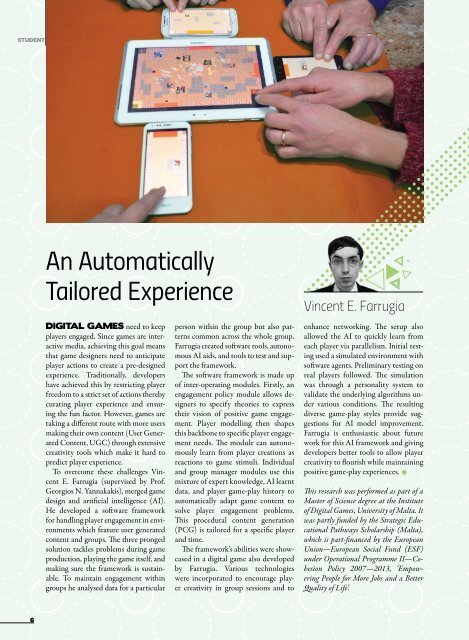Create successful ePaper yourself
Turn your PDF publications into a flip-book with our unique Google optimized e-Paper software.
Student<br />
An Automatically<br />
Tailored Experience<br />
Vincent E. Farrugia<br />
<strong>DIGITAL</strong> GAMES need to keep<br />
players engaged. Since games are interactive<br />
media, achieving this goal means<br />
that game designers need to anticipate<br />
player actions to create a pre-designed<br />
experience. Traditionally, developers<br />
have achieved this by restricting player<br />
freedom to a strict set of actions thereby<br />
curating player experience and ensuring<br />
the fun factor. However, games are<br />
taking a different route with more users<br />
making their own content (User Generated<br />
Content, UGC) through extensive<br />
creativity tools which make it hard to<br />
predict player experience.<br />
To overcome these challenges Vincent<br />
E. Farrugia (supervised by Prof.<br />
Georgios N. Yannakakis), merged game<br />
design and artificial intelligence (AI).<br />
He developed a software framework<br />
for handling player engagement in environments<br />
which feature user generated<br />
content and groups. The three pronged<br />
solution tackles problems during game<br />
production, playing the game itself, and<br />
making sure the framework is sustainable.<br />
To maintain engagement within<br />
groups he analysed data for a particular<br />
person within the group but also patterns<br />
common across the whole group.<br />
Farrugia created software tools, autonomous<br />
AI aids, and tools to test and support<br />
the framework.<br />
The software framework is made up<br />
of inter-operating modules. Firstly, an<br />
engagement policy module allows designers<br />
to specify theories to express<br />
their vision of positive game engagement.<br />
Player modelling then shapes<br />
this backbone to specific player engagement<br />
needs. The module can autonomously<br />
learn from player creations as<br />
reactions to game stimuli. Individual<br />
and group manager modules use this<br />
mixture of expert knowledge, AI learnt<br />
data, and player game-play history to<br />
automatically adapt game content to<br />
solve player engagement problems.<br />
This procedural content generation<br />
(PCG) is tailored for a specific player<br />
and time.<br />
The framework’s abilities were showcased<br />
in a digital game also developed<br />
by Farrugia. Various technologies<br />
were incorporated to encourage player<br />
creativity in group sessions and to<br />
enhance networking. The setup also<br />
allowed the AI to quickly learn from<br />
each player via parallelism. Initial testing<br />
used a simulated environment with<br />
software agents. Preliminary testing on<br />
real players followed. The simulation<br />
was through a personality system to<br />
validate the underlying algorithms under<br />
various conditions. The resulting<br />
diverse game-play styles provide suggestions<br />
for AI model improvement.<br />
Farrugia is enthusiastic about future<br />
work for this AI framework and giving<br />
developers better tools to allow player<br />
creativity to flourish while maintaining<br />
positive game-play experiences.<br />
•<br />
This research was performed as part of a<br />
Master of Science degree at the Institute<br />
of Digital Games, University of Malta. It<br />
was partly funded by the Strategic Educational<br />
Pathways Scholarship (Malta),<br />
which is part-financed by the European<br />
Union—European Social Fund (ESF)<br />
under Operational Programme II—Cohesion<br />
Policy 2007—2013, ‘Empowering<br />
People for More Jobs and a Better<br />
Quality of Life’.<br />
6


